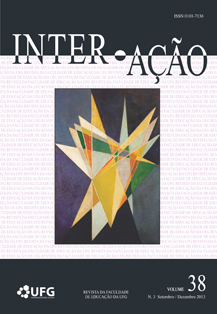POLÍTICAS EDUCACIONAIS PARA O SÉCULO XXI: ESTRÁTEGIAS PARA A FORMAÇÃO DE CONSENSO ATIVO
DOI:
https://doi.org/10.5216/ia.v38i3.20824Palavras-chave:
Autonomia, Política Educacional, Formação do consenso, Participação.Resumo
As políticas educacionais elaboradas a partir de meados dos anos 1990 e, principalmente, dos anos 2000 mudaram as estratégias para implementação de suas ações. Este artigo tem por objetivo discutir estas estratégias que visam a formação do consenso e preservação da hegemonia. Tais políticas, tomam como aspectos principais das ações a ênfase na aprendizagem, o incentivo a participação e autonomia, sempre sob a justificativa, quase inapelável, de melhoria da qualidade da educação. Considerando a escola como núcleo de gestão, as chamadas políticas para o século XXI têm focado suas ações sobre os responsáveis diretos por sua implementação: professores, equipe pedagógica, direção, pais e responsáveis.
Downloads
Downloads
Publicado
Como Citar
Edição
Seção
Licença
A Inter-Ação utiliza como base para transferência de direitos a licença Creative Commons Attribution 4.0 para periódicos de acesso aberto (Open Archives Iniciative - OAI). Por acesso aberto entende-se a disponibilização gratuita na Internet, para que os usuários possam ler, baixar, copiar, distribuir, imprimir, pesquisar ou referenciar o texto integral dos documentos, processá-los para indexação, utilizá-los como dados de entrada de programas para softwares, ou usá-los para qualquer outro propósito legal, sem barreira financeira, legal ou técnica.
Autores que publicam neste periódico concordam com os seguintes termos:
1) Autores mantém os direitos autorais e concedem à revista o direito de primeira publicação, com o trabalho simultaneamente licenciado sob a Licença Creative Commons Attribution que permite o compartilhamento do trabalho com reconhecimento da autoria e publicação inicial nesta revista.
2) Autores têm autorização para assumir contratos adicionais separadamente, para distribuição não-exclusiva da versão do trabalho publicada nesta revista (ex.: publicar em repositório institucional ou como capítulo de livro), com reconhecimento de autoria e publicação inicial nesta revista.
3) Autores têm permissão e são estimulados a publicar e distribuir seu trabalho online (ex.: em repositórios institucionais ou na sua página pessoal) a qualquer ponto antes ou durante o processo editorial, já que isso pode gerar alterações produtivas, bem como aumentar o impacto e a citação do trabalho publicado.















